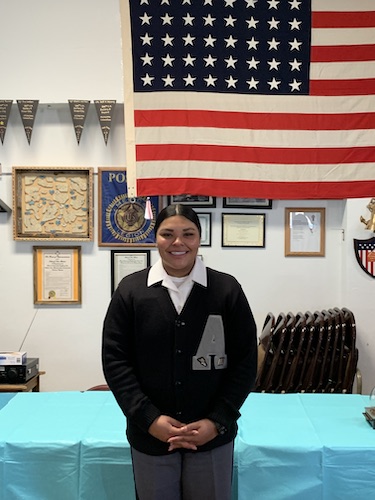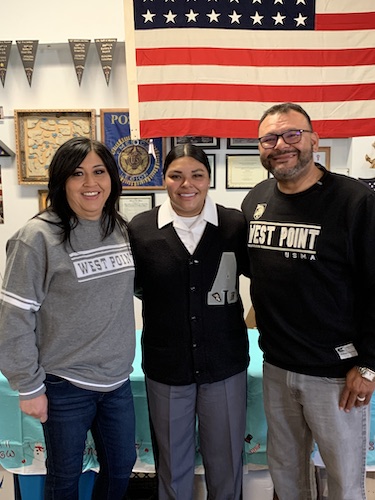 Aysia Salas at American LegionPhotos and article by Mary Alice Murphy
Aysia Salas at American LegionPhotos and article by Mary Alice Murphy
Aysia Salas, an appointee to the West Point Academy, who will graduate in May 2024, visited with at least 25 American Legion veterans on Wednesday, Nov. 22, 2023, at their regular coffee and doughnuts morning.
 Melissa, Aysia and Chris SalasHer father, Chris Salas, introduced her and said she graduated from Silver High School in 2018. He said she was the second female from Grant County to receive an appointment to West Point and the fourth student from Grant County. "She was recruited as a track athlete. She won the state championship here six or seven times in hammer and shot put. Last year at West Point, she was the Patriot League champion"
Melissa, Aysia and Chris SalasHer father, Chris Salas, introduced her and said she graduated from Silver High School in 2018. He said she was the second female from Grant County to receive an appointment to West Point and the fourth student from Grant County. "She was recruited as a track athlete. She won the state championship here six or seven times in hammer and shot put. Last year at West Point, she was the Patriot League champion"
"The strength of her diploma will match up with Harvard, Brown and other Ivy League schools," he said. "She's doing good work there. I like to brag on her; it's not really bragging as it's the truth. She wanted to come here and share with you about West Point and what she is doing there."
"I will graduate in May as a second lieutenant," Aysia said. "I started out as a freshman with basic training. Every summer we do training to help us lead soldiers. It's been a great opportunity for me, and it's an excellent education. It was hard and challenging for me to leave here and make the move across the country."
She said she is hoping to go into the aviation branch and expects to hear next Wednesday. "If I'm accepted, I would go to flight school in Alabama for two years, and it would make my commitment to serve 10 years. With all the branches it is five years, but the Army is having problems keeping pilots, so I'm not worried about the commitment because it's what I want to do. What I really want to fly are Blackhawk or Apache helicopters."
Her dad said she wanted to do something that would help her when she becomes a civilian. She could fly commercial or medical helicopters. She doesn't know what her future holds. "You probably know more than we do. We are not a military family. I'm still learning the words or acronyms she uses. I'm a teacher, but I'm getting taught things. We're still wondering what our role is in this, other than support. It's not every day that we drop off our naive little Mexican kid at West Point, New York, and turn around and come home and hope that she's going to be OK. That's why we wanted to come here to talk to you, so you can teach us and her about what to expect."
One veteran said: "When we started, we didn't know a thing, either."
A veteran asked her what her major is, and she replied that she will receive a degree in psychology. "If I get at least a masters while I'm in the Army, I will have more than one career path as a civilian."
Aysia said other opportunities that she has had include, because she had to take a foreign language, she chose Portuguese, so she got to spend three weeks in Portugal, where she learned about the culture and new food. "I had a chance to talk to their military, too. It was a great experience. This past summer, I went to JBLM (Joint Base Lewis-McChord) in Washington state where I shadowed a second lieutenant who was in a Blackhawk. I got to go on a field mission, where I got to see what they do."
"The summer training, as I get older with more experience, it gets harder," she said. "This past summer, I and my platoon ran eight missions in four days. It was challenging, sort of a reactive training, like ambushes."
American Legion Allingham-Golding Post 18 Commandant David Morrison thanked Aysia for choosing to join the military. "West Point is training you to be a leader. What have you learned about leadership so far?"
"We take a lot of leadership to develop character," Aysia replied. "My philosophy is to take care of other soldiers, other second lieutenants and create a great environment for everyone."
Her dad asked the veterans to give her advice. "A lot of people have told her to believe those who have actually served."
"People have told me to learn from other soldiers with experience and not to act like I know everything," Aysia said. "I know I'm not going to know everything. I'll be nervous and stressed. I need everyone to teach me and to build trust among us."
One veteran noted that second lieutenants don't have a long life expectancy in a war zone.
"I will be open to learning," Aysia said. "I know I will need help with a lot of things when I first start."
Chris said his stepdad was a Navy ship captain for two tours in Vietnam, so "we learned what he went through. It's why we look for support from you all, so she can learn valuable information."
Her mother, Melissa Salas, said she and Chris visited Aysia at West Point and attended one of her classes, an officer training class, where they were teaching her how to be a leader. "It really opened my eyes to how they experience different scenarios and how to make decisions, but they're out there and will have to make those decisions."
A veteran said his experience in Vietnam was if a second lieutenant came in and talked to the gunnery sergeant or first sergeant who had been there a year, "take advice from them, because they have been there before. In a war zone, you don't wear your rank, so you work together."
Another veteran said NCOs are the ones that do the work; "officers just look pretty. If you want to get something done, listen and learn.NCOs will guide your career."
A veteran also said: "They won't let you screw up, if you're new. Listen to the staff NCOs, because sometimes they will give you criticism. They may dress you down in private, but take the constructive criticism."
Her dad said the class they attended with Aysia, had a scenario between Russian and Ukrainian solders showed how to make the moral decision. "The instructor said: 'If you save your soldiers you have made the right decision. But you may not be judged that way.'"
Morrison said even in war, "You've got to remain objective. And you have to take care of your troops first. The decisions you make will save their lives and they will be your base."
Her dad said his mother-in-law is worried about what Aysia will be doing. "I said:'She is special to us, but why is she more special than someone who has served longer? She will remain special to us.'"
A woman veterans said she served more than 30 years ago. "Yes, you may have more challenges today, but if you make a mistake, be willing to accept it and apologize for it."
Chris asked a male viewpoint on whether there is a difference with how she will be treated as a female second lieutenant.
The same female veteran said: "Yes, I experienced prejudice, but there have been many trailblazers before you. There are some men who do not think women should be in the military. Yes, you may see prejudice especially in a war zone. You have to prove yourself and believe in yourself. You have to treat it objectively and let it roll off your back. You have to do your best and know who you are. Love them back and treat them well."
One veteran said he never had female officers when he served.
Another veteran said: "Know your job and if they question you, call them on it. Stand your ground."
A veteran said: "Proficiency is saving lives. Second lieutenants tend to charge. Don't charge. Execute well."
The female veteran said: "Never forget your standards. Stand by them. Don't be too lenient either way. You don't want to be a jerk, but you are the officer. You're the one in charge. You'll do fine with your psychology background and remember, you're the parent figure."
Aysia her experience has been challenging, "But I can't wait to graduate and do my job leading soldiers."
Another veterans said every branch has different standards, but during a tour in Iraq, "we had a captain and she almost got us killed. We had no respect for her. We had a Marine Corps lieutenant who—it was not that he broke the rules—but he said: 'I'm here to lead.' He ran a tight ship, but when things got bad. Rules of engagement. We had seen too many get killed in Fallujah. His thing was: 'We're all going to go home. We may go home a little crooked, but we're going to go home, not in a body bag.' Troop welfare was No. 1 for him as a Marine lieutenant. You're going to have to tap into all your knowledge, but you have to stay with your core values and your faith. There are two types of leaders—one who wants to lead by example or one that wants to lead just by pointing fingers. They won't respect you for that. This is my take—I do hope you get a combat tour. Why do you serve in the military? Maybe I'm just looking at it from the Marine Corps side, but you can't shadow-box your whole career. You have to get in the ring and prove yourself. That's what everyone in here has done it. Those who haven't served will have opinions, but those of us who serve, have served or are retired from serving, we have a different mindset. It is a mindset."
Aysia concluded by saying: "I've listened and taken in what all of you have said. I will try to put it into myself. You're what I want to be. Thank you. It's why I came here. Hopefully, I can go out and execute."
Then the teasing began among the veterans in different branches.
One invited Aysia to come back when she graduates—"Come back in uniform. We want to see those bars."
She replied: Thank you.
Aysia's father teaches special education at Silver High School and coaches power-lifting and track and field. Her mother is a nurse at Fort Bayard Medical Center